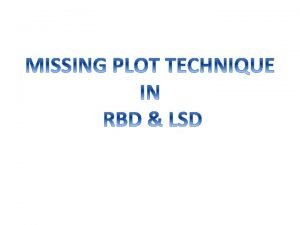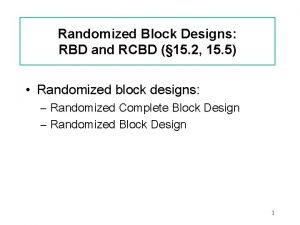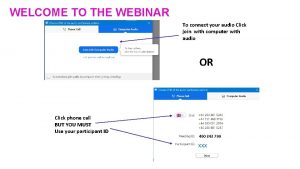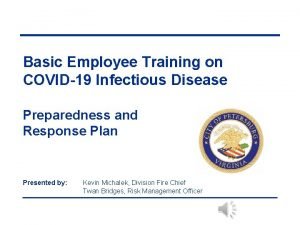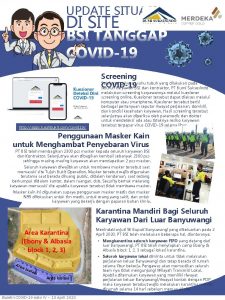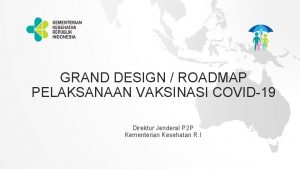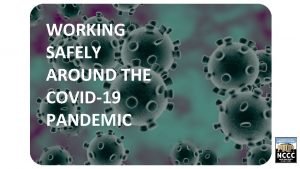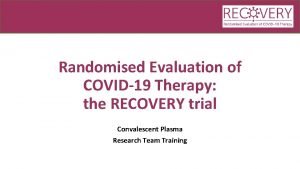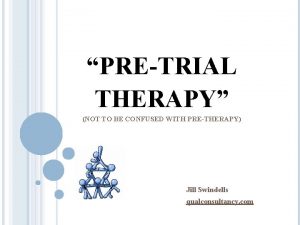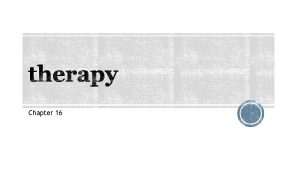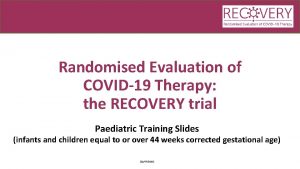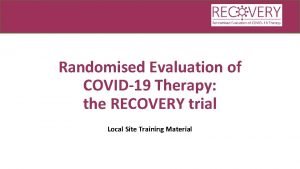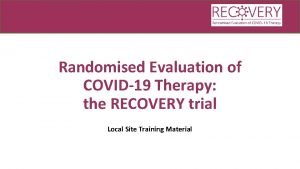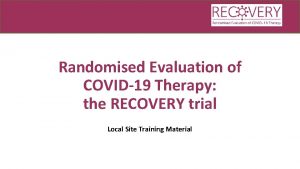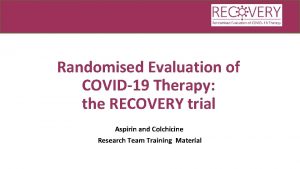Randomised Evaluation of COVID19 Therapy the RECOVERY trial









- Slides: 9

Randomised Evaluation of COVID-19 Therapy: the RECOVERY trial Local Site Training Material

Background • A novel coronavirus-induced disease was identified in Wuhan, China (COVID-19) • In January 2020 the Chinese CDC identified the causal agent as a new betacoronavirus (SARS coronavirus 2 or SARS-Co. V-2) • Symptoms vary from none to severe pneumonia in a minority • It is estimated that in the UK 50 million people may be infected, of whom 5% may need admission and of these 30% might need level 3 (ICU) care • The progression from prodrome to severe disease takes 1 -2 weeks, offering a therapeutic window • Currently there are no proven therapies for COVID-19

RECOVERY trial design No additional treatment ELIGIBLE PATIENTS Lopinavir-ritonavir 400/100 mg bd PO for 10 days 1. Age ≥ 18 years 2. Admitted to hospital 3. Proven or suspected SARSCo. V-2 infection R Dexamethasone 6 mg od PO/IV for 10 days Hydroxychloroquine See protocol for dosing Azithromycin 500 mg od PO/IV for 10 days OUTCOMES Primary: all-cause death Secondary: • Duration of hospitalisation • Need for ventilation • Need for renal replacement therapy

Study treatments: Lopinavir-Ritonavir • Licensed for treatment of HIV • Lopinavir is a protease inhibitor (combined with ritonavir to increase lopinavir’s plasma half-life) • Shown to have in vitro activity against SARS and MERS viruses • Contraindications: severe hepatic insufficiency; co-administration with other drugs dependent on CYP 3 A metabolism (Alfuzosin, ranolazine, amiodarone, dronaderone, fusidic acid, neratinib, venetoclax, colchicine, astemizole, terfenadine, lurasidone, pimozide, quetiapine, dihydroergotamine, ergonovine, ergotamine, methylergonovine, cisapride, elbasvir/grazoprevir, ombitasvir/paritaprevir/ritonavir, lovastatin, simvastatin, lomitapide, avanafil, sildenafil, vardenafil, midazolam, triazolam. ) • Side-effects: diarrhoea, nausea and vomiting

Study treatments: Dexamethasone • Modulates immune system which may be beneficial in context of severe pneumonia with superimposed ARDS • Contraindications: none • Side-effects: hyperglycaemia, mood/sleep disturbance, hypernatraemia

Study treatments: Hydroxychloroquine • Anti-malarial drug which has in vitro activity against SARS viruses • Contraindications: long QT syndrome. • Macrolide antibiotics and quinolones should be prescribed with care as they also prolong the QT interval • Side-effects: QT interval prolongation (but arrhythmias rare), itchy skin (especially in dark-skinned patients), headache

Study treatments: Azithromycin • Commonly used antibiotic (“macrolide”) with antiviral and immunomodulatory properties • Contraindications: long QT syndrome, allergy to macrolide antibiotics • Side-effects: QT interval prolongation, interaction with other drugs (ciclosporin, digoxin)

Randomisation • If a study treatment is contraindicated in a given patient, then they can still be randomised • Randomisation will allocate them to one of the other treatments • Randomisation is ‘simple’ (i. e. no stratification or minimisation) • Randomisation ratio is 2 (standard care): 1: 1: 1

Identification and invitation • All adult patients with proven or suspected SARS-Co. V-2 infection admitted should be considered for trial • Should be discussed with senior member of clinical team and assuming 1. All eligibility criteria are met; and 2. No medical history that might, in the opinion of the attending clinician, put the patient at significant risk if he/she were to participate in the trial, the patient should be offered participation • All documents available on trial website: www. recoverytrial. net
